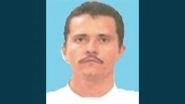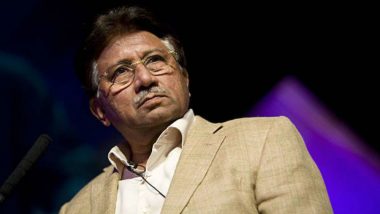Islamabad, March 6: The Pakistan Bar Council has filed a petition in the Supreme Court challenging the Lahore High Court's order to quash the death penalty of self-exiled former dictator Pervez Musharraf in a treason case, a media report said on Friday.
A special court in Islamabad on December 17 last year handed down the death penalty to the 74-year-old retired general Musharraf, now based in Dubai, after six years of hearing the high-profile treason case against him. However, on January 13 Musharraf's trial in the high treason case was declared as "unconstitutional" by the LHC, leading to the annulment of the death sentence against the former president. Pervez Musharraf, Former Pakistan President, Gets Death Penalty in High Treason Case.
The Pakistan Bar Council on Thursday filed a petition against the LHC order.
The petition filed on behalf of PBC vice chairman Abid Saqi and supported by Supreme Court Bar Association president Syed Qalb-e-Hassan among others has sought the apex court to set aside the LHC judgement, and questioned whether high court enjoys territorial jurisdiction to entertain ex-president's plea, the Dawn reported.
The Pakistan Muslim League-Nawaz (PML-N) government led by former prime minister Nawaz Sharif had filed the treason case against the former army chief in 2013 over the imposition of an extra-constitutional emergency in November 2007, which led to the confinement of a number of superior court judges in their houses and sacking of over 100 judges.
The LHC in its January 13 order declared that the formation of the special court was "unconstitutional" and that the treason case against Musharraf was not prepared in accordance with the law.
"The petition questioned whether the LHC enjoyed territorial jurisdiction to entertain a constitutional petition filed by Musharraf against an order passed by the special court - a court beyond the LHC's territorial jurisdiction," the report said.
The LHC should have stayed proceedings on the petition as the Islamabad High Court was already seized with a similar one, the PBC argued. The petition sought to know whether the special court, established under the Criminal Laws Amendment (Special Court) Act 1976, was a person performing functions in connection with the affairs of the federation, a province or a local authority, the report said.
The PBC petition also asked whether a high court has jurisdiction to entertain a constitutional petition, especially before conclusion of a trial, and whether the court can assume jurisdiction against an order which was appealable before the Supreme Court only.
Emphasising that the petition described the January 13 LHC order as contrary to the principles of res-judicata ( respect and finality to the Judicial decisions), the petitioners asked whether the LHC erred in law by entertaining the constitutional petition filed by Musharraf, especially when it was an established principle of law that the jurisdiction of the high court under Article 199 was a discretionary relief and can only be granted to a person who approaches the court with clean hands.
"But in the present case, the petitioner before the high court (Musharraf) was an absconder who had been evading the law for a number of years," the PBC petition observed. Former president's attorney Salman Safdar had filed an appeal earlier, stating that the requirement of surrendering Musharraf is not applicable owing to his health condition.
It also mentioned that the former military dictator tried to return to Pakistan but was unable to because of his deteriorating health. Musharraf, who ruled Pakistan from 1999 to 2008, was the first military dictator convicted for subverting the Constitution.
The former military ruler, who has been living in Dubai since March 2016, left Pakistan for medical treatment and has not returned since, citing security and health reasons. According to Pakistani media reports, Musharraf suffers from amyloidosis, a rare disease caused by the build-up of an abnormal protein called amyloid in organs and tissues in the body.













 Quickly
Quickly


